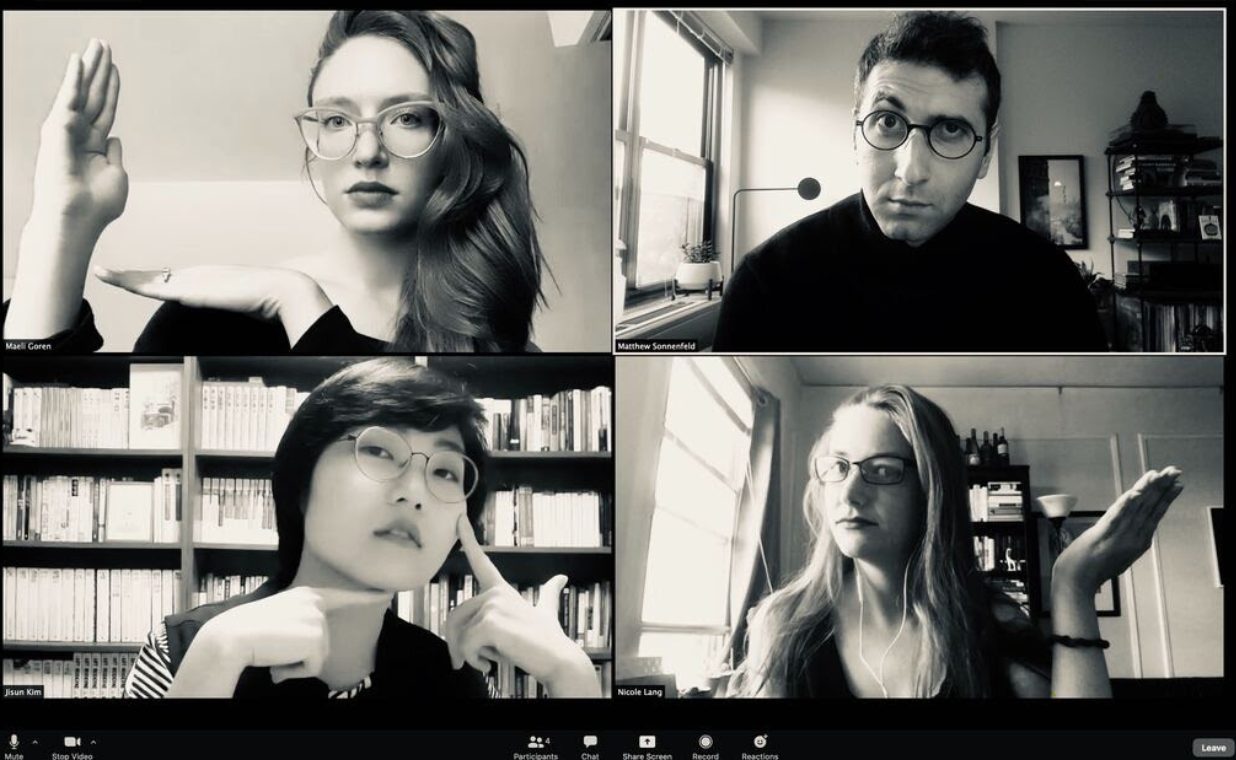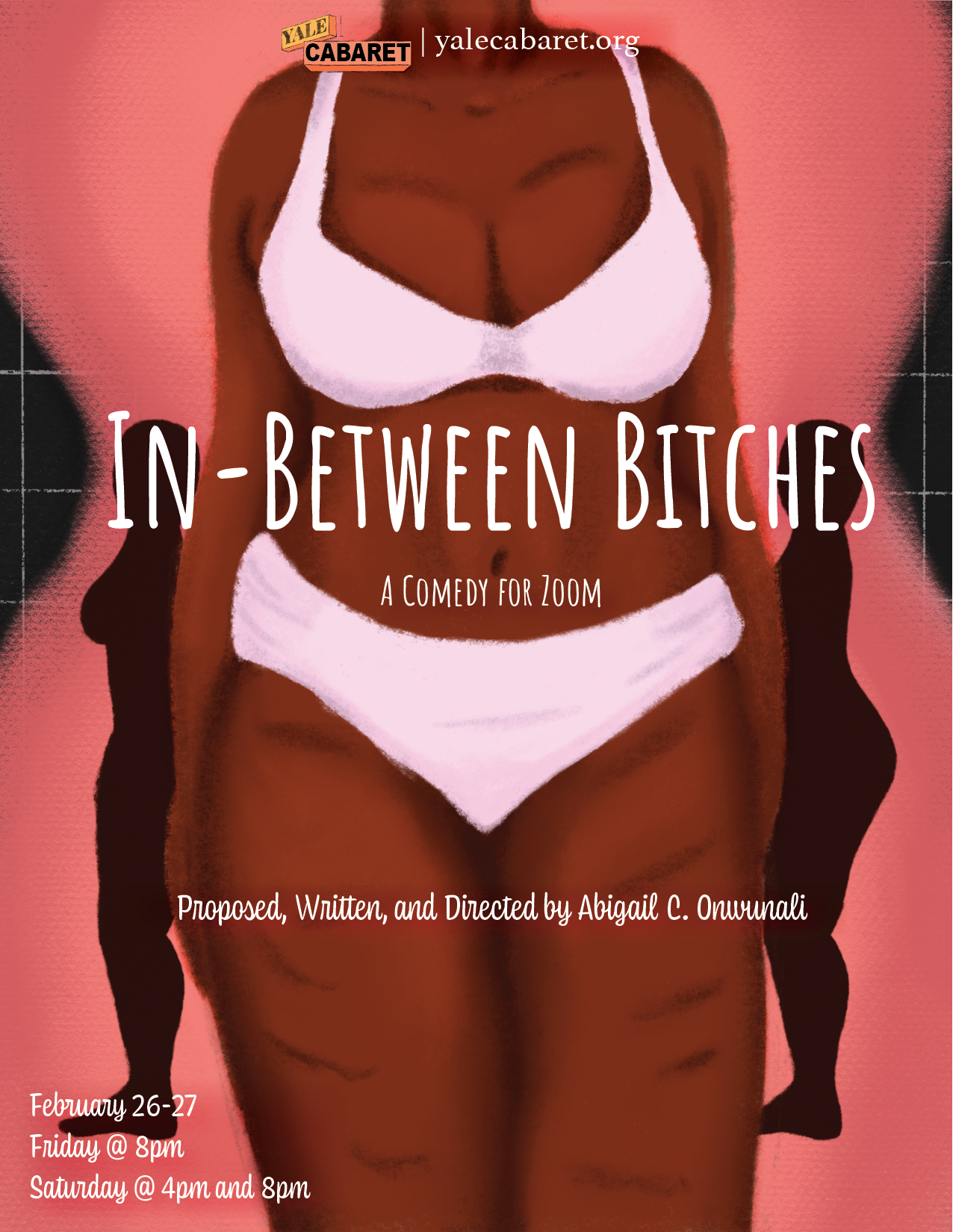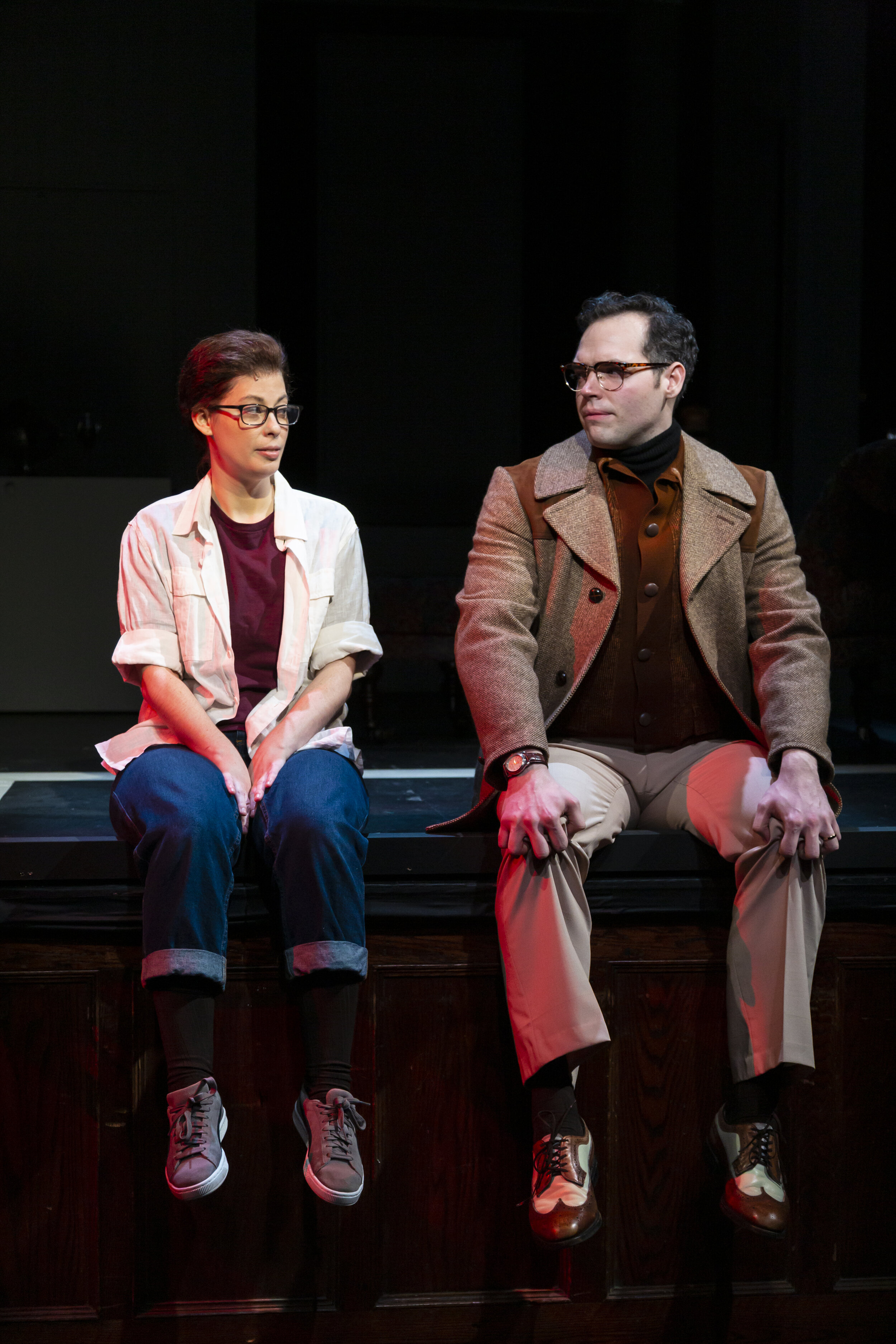Yale Cabaret preview, February 27 to May 20
The Yale Cabaret, the branch of the Yale School of Drama run by students and usually housed in the beloved basement theater at 217 Park in New Haven, returned last weekend from Yale’s extended winter break with its first show of 2021, Let’s Go to the Moon. This weekend, In-Between Bitches, their second show of the spring semester, opens.
The great challenge for the theatrical institution, now in its 53rd year, is that theater for the foreseeable future is not what it was. The team’s slogan this year is “Live Online Together” and their solution to the closing off of all theaters on campus is a combination of live and pre-recorded events that are broadcast live. Which means the links to the shows can only be accessed during set times to which viewers commit: Fridays at 8 p.m., Saturdays at 4 p.m. and 8 p.m., for most of the shows. The intention is to maintain some of the charm of the Cabaret’s sense of participatory community. We may all be stuck in our homes but at least we can attend online events together.
Cabaret 53 Team, clockwise from top right: Managing Director Matthew Sonnenfeld, Co-Artistic Director Nicole Lang, Co-Artistic Director Jisun Kim, Co-Artistic Director Maeli Goren
The leadership team of Cab 53 consists of Co-Artistic Directors Maeli Goren, a third-year directing student; Jisun Kim, a third-year dramaturgy student; Nicole Lang, a third-year student of Lighting Design, and Managing Director Matthew Sonnenfeld, a second-year student in Theater Management. The mission of the team underscores collaboration and a sense of neighborliness in reaching out to “greater Yale”—which means students outside the School of Drama—and to the New Haven community more broadly. And even, with the tenth show of the season, to an international community of artists not present in New Haven or at Yale.
Last week’s show was a good example of the kind of collaborative projects the team hopes to inspire. Originally, Let’s Go to the Moon was a “filler art pitch” for the website, described as “four queer astronauts go to the moon.” The sample pitch developed into an actual pitch and became a collaboration between Kim and Lang, as the hands behind the puppets used for the play, and composers Soomin Kim and Samantha Wolf and lyricist Alana Jacoby for the songs—ten in all—expressly written for the show (in place of the cover songs initially considered).
The production was “hybrid,” in that it was both live and recorded. The audio, which means the dialogue and songs sung by the cast (Shimali De Silva, Mouse; Madeline Seidman Woman from Venus; Maeli Goren, Moon Rock; Sad, Old Rover, Nat Lopez) was pre-recorded; the visuals, however, which involved both 3D and 2D puppets, and two cameras for each, were enacted live by the puppeteers and co-creators of the piece, Jisun Kim and Nicole Lang—the “Astronauts and Chief Administrators,” according to the very creative playbill, available on the Cab website. Thus the show viewers saw was sort of like lip-synching . . . but with puppets and no visible humans.
The tech resources were impressive—if only to consider the switching between cut-out and modeled puppets. Key to the show’s technical polish were two stage managers—Brandon Lovejoy and Charlie Lovejoy—a technical director (Laura Copenhaver), designers for 3D puppets/scenic design (Emmie Finckel and Marcelo Martinez Garcia), designers for sound and incidental music (Emily Duncan Wilson), and for pre-show video (Camilla Tassi); the show was produced by Will Gaines and assistant producer Wendy Davies.
What was it all about? A charming NASA lab-mouse, convinced that an endless supply of cheese can be found on the moon, steals a rocket and sets off. En route she encounters a series of misfits: a Woman from Venus, who has fallen in love with “the woman in the moon” (instead of a man from Mars), a space-borne rock convinced that her origins are the earth’s moon, and, after a journey down a wormhole and a crash-landing on an unknown planet, an Old, Sad Rover who speaks only in the singsong of “Happy Birthday to You,” and whose mission to the moon went awry some time before. Together they undertake a final try at a moon-landing, only to learn that their ad hoc togetherness is enough to constitute a valuable universe in itself. The songs provide both catchy commentary as well as character and situation exposition.
The visuals available in the online medium were the stars of the show, and that sets up a point Sonnenfeld made about the upcoming second half of the season. In the fall, there were many shows that were audio only—including a radio play of Ibsen’s A Doll’s House, set in India. It seems the challenge of writing for Zoom has been taken up by the YSD community and so what we’ll be seeing in the months ahead more fully activates the technologies of online theater.
As Sonnenfeld pointed out, the Cabaret’s brief with its participants has been “providing a room,” and the equipment that goes with it, to the students who elect to create shows during a season. In these changed circumstances, the team has had to be much more hands-on, as Goren noted, helping the chosen projects find a way to be realized within current constraints—and new possibilities. As a team, Cab 53 has welcomed proposals as open-ended as possible while also rising to the challenge of the extra foresight needed to make an idea come to life online. It’s a more time-intensive commitment and requires resources of ingenuity beyond those familiar to the 3D stage. Which means this is a good place for a shout-out to the technical advisers of this year’s Cabaret: Technical Supervisors Cameron Waitkun and Nicolás Cy Benavides, both first-year Technical Production and Design candidates. And mention should be made as well of a new position associated with the Cab this season: Rebecca Satzberg, a Technical Sound Intern at YSD, works as the Accessibility Assistant, which entails everything from technical issues for those trying to access video in different environments to close-captioning each performance, to anything that helps create a virtual environment that pushes the limits of what can be made available online.
This weekend’s show, Cab 8, as well as Cab 10 and 11, are cases in point. All were written for Zoom, and so the Cab has gone from providing the room to providing the Zoom—and all the capabilities that come with it. Like Cab 7, Let’s Go to the Moon, these shows will be creations specifically for Zoom Space.
Cab 8: In-Between Bitches, billed as “A Comedy for Zoom,” proposed, written & directed by Abigail C. Onwunali, the show addresses issues of what Goren called “body awareness,” and the ways in which the theater community avoids questions of shame and dysmorphia. Goren also called the show “joyful and hilarious,” featuring an “all womxn team” tackling the stress of image and the ways one particular “in-between bitch” handles it. Two more shows today at 4 p.m. and 8 p.m. Content Warning: “Depiction of eating and body dysmorphia disorders, coarse language, moments of loud, high-pitched sound.”
Cab 10: Expats Anonymous is rather unprecedented. The play was written by Rachel Chin who is not a student at Yale, but a theater artist in Singapore who heard of the Cab through colleagues and proposed the piece, which will be the first international collaboration offered as a scheduled part of the Cab season. As a Zoom play, the show not only makes a virtue of the virtual environment—bringing together collaborators on different continents—but dramatizes Zoom as a part of job interviews. Set in Singapore during the current pandemic, the play looks at the situation of unemployed expats vying for a single job that will allow them to remain. May 18-20 at 8 p.m. and May 20 at 5 p.m.
With Cab 11, Love in a Pan Dulcé, we move from business to pleasure. Not only is Zoom part of the arduous process of finding work, it’s also part of the arduous process of finding a date. To put it in the terms of the Cab’s website: “Come laugh, cry, and cringe as Rachel, Joey, Noah, Arnie, Michael, and Daniel navigate the trials and tribulations of dating in 2020.” A play for Zoom, written and proposed by Nomè SiDone. April 16-17
Cab 9 will feature the return of the annual Dragaret—a drag show that, for the last few years, has included a night for New Haven queens and a night for YSD students. The particulars of this year’s offering, in the online environment, have not yet been determined, but tickets for the show are separate from the single membership fee that permits access to all the other shows and to the Cab Gallery. More information about the pricing policy and about the show and its line-up, which should involve both recorded and synchronous performances, will be forthcoming shortly. But mark your calendars now: March 12-13. The show has long been very popular as an entertaining and unpredictable celebration of the non-conformism and fluidity that gender, as a performative element of identity, can give rise to. Particularly among highly gifted and theatrical individuals.
Cab 12 also continues a Cab tradition, though this one of more recent provenance. Cab 51 set up the Rough Draft Festival as a way to bring on work in progress and the kind of work outside of concentration that is one of the Cab’s selling-points. The particulars have still to be determined, though the dates have been set: April 30-May 1. The team is considering potential collaborations extended to students in New Haven area schools. This is the second festival of the season; in December, the very successful Black Theater Festival brought together a highly eclectic offering of plays, performance, and interactive events.
Cab 13, the final show of the season, might be considered a transition back to “normal theater.” At least, the two one-person shows brought together for Remanded Trials might be enacted on a stage—though there may be benefits to the virtual space. Both feature acting students in YSD who have written parts to enact. In “Death Sentence” Matthew Webb will give a Cab debut performance as a man interrogated for serial murders. Called a “darkly humorous mystery” by Lang, the show “meditates in different ways on justice” and whether “character is death?” In “Kitchen of Truth” Madeline Seidman plays Martha Stewart in a dark night of the soul—including a hallucinated final television episode—on the night before she is taken into custody. May 7-8
That’s it for the shows scheduled, but membership in the Cab Season (go here for more details) also includes two Cab Potlucks, which aim to promote a virtual version of the valued face time usually found at the Cab as fans and patrons meet and eat and drink and circulate. The next one is April 24, and the final one is at the close of the season, as a send off and celebration, May 20.
The other perk of membership is entry to the Cab Gallery which features curated exhibits of installations, videos, sound compositions and more.
As Sonnenfeld noted, the upside of the virtual environment, for theater, is that the 70 seat capacity of the Cabaret can be—and frequently has been—doubled or tripled this season. There’s much more ease of access, and though we miss the togetherness of the Cab and mourn the emptiness of the theater at 217 Park Street, the Yale Cabaret as a virtual environment remains a viable and lively space for theatrical experiments and experiences. “See” you “at” the Cab!
Yale Cabaret
Spring Season: February 19-May 20, 2021






